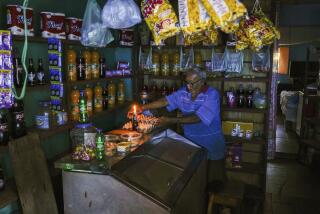Strike in Venezuela Widens; Oil Sector Hurt
- Share via
CARACAS, Venezuela — A national strike was extended another day Wednesday, a surprise move that dashed hopes for a quick return to negotiations for a permanent solution to this country’s worsening crisis.
There were also signs that Venezuela’s crucial oil sector was suffering -- a development that could threaten the nation’s economic and political stability.
An oil tanker captain for the state petroleum company took to the airwaves late Wednesday to declare that he was joining the strike, refusing to unload a shipment of 280,000 barrels of gas bound for local markets.
And tugboat captains announced that they would no longer guide ships in and out of the narrow strait leading to Lake Maracaibo, the center of Venezuela’s oil industry.
“We have to continue acting with the same firmness and the same power,” said Carlos Ortega, president of the Confederation of Venezuelan Workers, the country’s largest labor union. “The strike continues. It isn’t stopping.”
The decision caught off guard government negotiators and Cesar Gaviria, the secretary-general of the Organization of American States and mediator for talks between the opposition and President Hugo Chavez.
The talks had been expected to resume to discuss the opposition’s demand for a referendum in February on Chavez’s rule.
Chavez, who was briefly ousted in a coup in April, has said no referendum is permitted until August under Venezuela’s constitution.
Gaviria said the decision to continue the strike a fourth day threw into doubt recent advances.
“We have to wait and see how this polarizes the situation between the government and the opposition,” said Gaviria, who has spent a month trying to get the two sides to reach an accord. “This can make the situation much more tense.”
Government officials continued to insist Wednesday that most people were going to work, but the strike seemed to have moved beyond the question of participation and into a new, more dangerous phase.
The strike had been losing force until National Guard troops unleashed a barrage of tear gas on unsuspecting protesters gathering for a demonstration in front of a state oil company building Tuesday.
The attack energized the opposition, a leaderless though determined group that includes unions, businesses, media groups and church figures.
They believe that Chavez is becoming an increasingly authoritarian figure leading the country to financial and social chaos.
The attack especially angered employees with the state oil company, PDVSA, many of whom were gassed in the attack and who have long complained that Chavez is installing unqualified supporters within the company.
On Wednesday, oil company employees were among the most ardent supporters of continuing the strike, according to several people close to the strike committee and negotiations.
That in turn raised fears that the strike could turn ugly. PDVSA employees’ decision to join a strike in April led to the coup, which left more than 60 dead in running street battles. Chavez was returned to power two days later by loyal supporters and military forces. He has been engaged in a political struggle ever since with an opposition that continues to seek his removal.
The opposition says that more than 90% of white-collar employees and about 65% of blue-collar employees are on strike.
In addition, at least one oil terminal, in Puerto La Cruz, was shut down Wednesday, according to the provincial governor.
Oil analysts said that the strike would first be felt on local gas supplies, then on international markets.
“When you begin to affect your local markets, things get complicated,” said Alberto Queros, an independent oil analyst. “It’s going to be very important to reach an agreement.”
Even government officials, who continued to insist Wednesday that oil production remained unaffected, sounded nervous.
“With a petroleum strike, nobody wins, and everybody loses,” said Ali Rodriguez, the head of the state oil company. “I’m worried, and I’m busy.”
More to Read
Sign up for Essential California
The most important California stories and recommendations in your inbox every morning.
You may occasionally receive promotional content from the Los Angeles Times.










